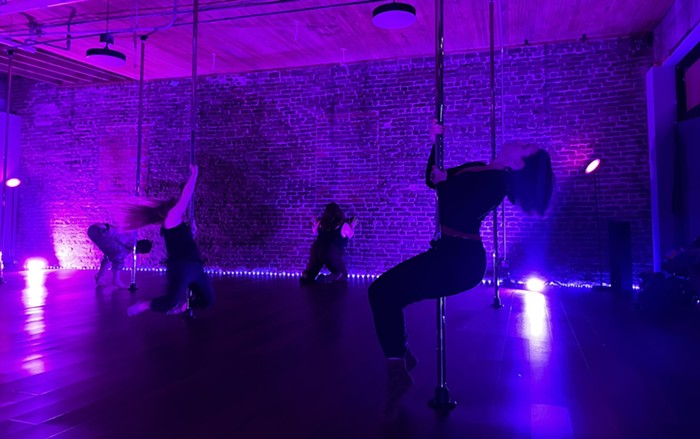I could feel my stomach clawing its way up my throat as I sat in the upstairs hallway of Theater Puget Sound, tucked above the maze of the Armory. I was about to audition for a spot on an improv team with Bandit Theater.
Bright-eyed hopefuls clogged the narrow hallway near the fourth-floor elevator. The cacophonous wave of warm-up sounds—frantic crazy-eight countdowns, hypnotic “bunny, bunny” chants, a myriad of frenzied, nonsensical three-line scenes—beat against the walls over and over.
Panic flickered. This was a lot of people all vying for the same spots. My heart pounded. Was I really good enough?
Before I fell too far down that rabbit hole, I saw people I recognized. There was Tiger. Chris. Annie and Derek. Sam, Chido, Jeff, and Drew. “Anyone want to warm up?” Someone asked.
We found a spare section of hallway and added our voices to the churning chorus of warm-up exercises. Lost in their familiar rhythms, the nerves faded to excitement.
For the last nine months, I’ve learned the gospel of ‘Yes and” in the cult of improv theater. I wish I could say I was doing this as immersive journalism, but I sought out improv for myself independent of this column. It just so happened I found a vibrant community of anxious dorks growing the Seattle improv scene. I had to write about it.
One of the most exciting things for me about finding a subculture of my own is how I’ve begun to fit into it. I’ve tasted that sensation and envied it in my previous “Play Dates,” forgetting how I was forging that for myself with Bandit Theater. I feel at home with people I barely know. The comedy, though I’m still learning, comes more naturally than I thought. The earnestness of the art form—its vulnerability, its silliness—has been good for me and my snark-hardened perspective.
Bandit who?
Bandit Theater began out of spite in 2018 when Annie Barry, founder and creative director, packed up and left D.C. after facing harassment at an improv theater there. And that wasn’t the first time. Similar experiences happened at theaters in New York.
“I felt really frustrated that the people in charge just seemed kind of ambivalent at best and horrible and manipulative at worst,” Barry said.
I can do this better, she thought. And so, sight-unseen, Barry moved to Seattle to start Bandit, a long-form improv comedy theater. She brought a new theater (though, with art space hard to come by, it does not have a permanent home) and a new style to Seattle. She worked as a nanny during the day and worked on Bandit at night.
At the time, Seattle improv consisted of Jet City Improv, Unexpected Productions, and Comedy Sportz. These theaters mostly—if not exclusively—did short-form Whose Line Is It Anyway-style shows full of one-liners and quick-witted games.
Long-form focuses more on story with complete scenes of fully realized characters, relationships, and settings. It’s a style popular in New York, Chicago, and Los Angeles, but not really seen outside of those show biz meccas. Someone told Barry “long-form was the Wild West out here,” so she called her theater Bandit.
Barry’s Bandit began with one class and one stage show, The Reader, where she reads an audience member's tarot cards and improvisers do a set based on notable tidbits they hear during the reading. As a "roving improv theater" without a permanent home, momentum was scattershot.
By the end of 2019, things looked really good. The other shoe dropped in March 2020 when, well, you know. The pandemic hit two months after Barry quit her nanny gig to focus on Bandit full-time.
After two years of stress and starts and stops, Bandit became bigger than ever with five full-cast teams, a fledgling sketch-writing program, and four levels of improv classes. Barry is involved in every inch of the operation.
Part of that equation is the classes. Barry has taught improv to women overcoming abuse in shelters, she’s taught ex-cons, she’s taught people as part of their rehabilitation in drug court. She sees improv as transformative.
“Everyone can learn it and everyone can benefit from the skills,” Barry said.
I put that to the test during one of those rare, smokeless windows last September.
Class Is in Session
According to Barry, improv is like learning a new instrument and a new language.
“It’s essentially brushing your brain,” Barry said.
Last fall, I was in need of a brain brush. I’d quit my full-time job over a year ago at that point and still had little clarity around my career, my sense of self. Complicating things were the post-concussive symptoms still plaguing me from a fall last March. Fatigue found me regardless of how carefully I lived my life each day. Headaches made reading a pain and writing impossible. I stopped going out as much. I went to bed earlier. Life quieted to accommodate the mental sluggishness of my new reality.
So, naturally, I signed up for improv. I don’t know why, exactly, except it was something I’d always wanted to do, and I longed for new experiences and new faces in my life.
The hours leading up to the first class were torture. The regular anticipatory jitters about my comedic ability combined with anxiety about my literal physical ability. Would this one class leave me bedridden for days? How could I make friends with my unique cocktail of post-pandemic social awkwardness mixed with post-concussive aphasia?
After two-and-a-half hours of funny walks, silly voices, and make-believe come alive, all of the tension melted away. Somehow, my head didn’t hurt.
That’s where I met Drew Jacobsen, a self-described 26-year-old tech bro; and Jeff D’Angelo, a 33-year-old charge nurse at Seattle Children’s Hospital.
D’Angelo discovered Bandit when he attended the "Swipe Right" show, where cast members improvised on details they learned from D’Angelo’s online dating profiles.
“I started twerking on stage as a subject of a show, and now I’m twerking on stage as an improviser,” D’Angelo said.
The three of us fell hard for improv after that first class. We’ve taken three quarters of improv classes now, and we've performed in multiple student shows together. We’ve done scenes living in a society where the cops arrest you if you don’t have a dog, dreamt up the details of a sexy Bar Mitzvah, and blended timelines with a scene about George Bush painting portraits instead of dealing with 9/11.
“What officially hooked me and has been very good for me is improv is a safe place to embrace uncertainty and let go of control. It’s been therapeutic to go in and be uncertain in a situation and see what happens,” D’Angelo said.
Jacobsen, who describes himself as “an extremely anxious person,” was nervous before class until he spoke for the first time.
“I realized nothing mattered and I could just be stupid and no one cared,” he said. “Then, once I realized everyone was going to be stupid, I was more comfortable stupid.”
[ENTER: Anxiety]
As it turns out, a lot of us are generally anxious, in-our-heads people. Other classmates we met in consecutive classes also dealt with their anxiety through improv.
Sam Cooper, 32, was so nervous he showed up for his first improv class at Jet City Improv in 2017 “a week early” and had to take medication so he “didn’t throw up.”
“Then the very first thing we did is the instructor put on music and we had to dance,” Cooper said, “which was terrifying because I’m not a public dancer.”
“I’m not even a private dancer,” he added.
Cooper grew up as a charismatic kid in Bellevue, “making up catch-phrases and bouncing off the walls.” Teenagerdom came with an anxiety disorder diagnosis.
“I dropped all of that to manage my anxiety,” Cooper said. “Going into improv very much feels like a return to my child self, where I get to be bubbly and exciting and people laugh and I’m not second-guessing myself with all of the things an anxiety disorder puts in my brain to stop me from having fun.”
Making an audience laugh is better than most therapy, he said.
A Community of Sweethearts and Angels
Joining Bandit and the broader improv community has given Cooper a built-in social circle.
“Improv by its nature is a collaborative art form, so you quickly form a tight-knit group of people,” Cooper said. (Though, he hasn't found any romance, which was one of his hopes. If you are single and interested, you can find him cruising the streets of Kirkland on his electric scooter.)
Jessi Smith, 32, didn’t want to do improv at all. She was pissed that her partner dragged her to the class. But that anger didn’t last long. One thing Smith values is the “weird intimacy improv ignites,” she said.
“We’ve never really hung out outside of class together,” Smith said about our classmates, “but I know we can talk about real shit. You’ve seen me give fake birth on the floor, of course I’ll accept you as you actually are.”
Barry’s insistence that Bandit is a safe, welcoming place, and her openness as a leader is partially to blame for the theater's friendliness as a whole. She brings that positivity to Bandit's teaching ethos.
“In New York classes there was this energy of like 'Go ahead, make me laugh,' Barry said, crossing her arms and adopting a gruff, serious voice, “And I was like, 'Ahhh, am I going to be funny?' Her voice climbed up a panicked octave. “And every Bandit teacher has this energy of”—her tone shifted upbeat—“‘I know you’re going to make me laugh! Go! Go! I love it!’”
The support from Barry and the teachers is palpable. She backs that up with real opportunities to grow. Bandit gives new performers an opportunity on the stage with student shows and now with the new "Tumbleweeds" program.
Tumbleweeds
Barry divided up my cohort for our auditions. D’Angelo, our other classmate Chido, and I were in the same group with a slew of people we didn’t know. This summer, Barry decided to pause the regular stage shows and run multiple teams full of up-and-coming performers.
“There’s a chasm between classes and the main stage,” Barry said. “We don’t want to be that way. We want to teach people and get them on stage and let them feel that atmosphere.”
"Tumbleweeds" provides that opportunity by giving new improvisers a dedicated team and director, plus three performance slots across two months. By the fall, Barry hopes these teams will be prepared to fill two new main stage shows she has planned, or feel ready to audition for any open slots on the other casts.
“It’s essentially Triple-A ball,” Barry said.
I strode into a room crammed with Bandit performers, teachers, and directors. We had 15 minutes. Our suggestion? It was either “fairy” or “ferry.” I didn’t get the spelling.
The minutes flew by in a flurry of bits about fairy godmothers, Washington state ferries running aground, grizzled mechanics, etc. I tried to remember to use my body more, acting and miming instead of standing still and quipping. But everything went so fast. All I remember was embodying a disgruntled ferry passenger yelling that I was going to call Jay Inslee.
A week later, after feeling very insecure on the class WhatsApp group chat, I got the email. I made it on a Tumbleweeds team. So did everyone else in my class who auditioned, though most of us are on different teams. Our first performance is on Friday.
Barry said she initially only planned on four Tumbleweed teams, but 75 people auditioned. So she added a fifth team. There's a hunger for improv in Seattle. By growing more teams, adding more venue space (and hopefully finding a permanent home), Barry is providing.
“The reason I started this was because I just wanted to do improv,” Barry said. “I want to teach people improv. I want people to have a good time because the world is so serious and terrible and unjust and climate change and all these things. Can we just have a laugh? Can we just enjoy having a laugh together?”
Any ideas on which Seattle subculture I should explore next? Want me to tag along with you on your favorite hobby or pastime? Send me tips at playdate@thestranger.com.




















